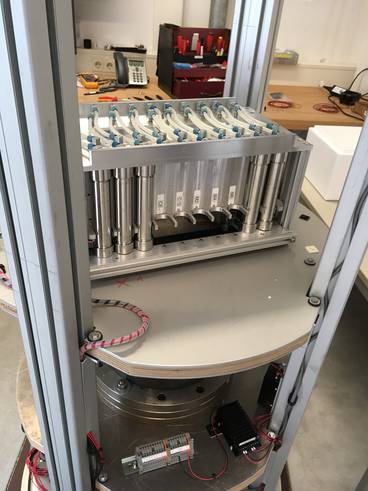Drop Tower - induzierte Phosphorylierungsänderungen in der Schotenkresse (DROPS)

research area: biology
experiment title:
Drop Tower - induzierte Phosphorylierungsänderungen in der Schotenkresse (Arabidopsis thaliana)
experiment acronym: DROPS
funding agency: DLR
grant number: 50WB1530
performing organization:
Johann Wolfgang Goethe-Universität Frankfurt am Main /
DLR - Institut für Luft- und Raumfahrtmedizin, Biomedizinische Forschung, Gravitationsbiologie, Köln
prime investigator:
Dr. Maik Böhmer /
PD Dr. Ruth Hemmersbach
experiment objective
abstract
In the long term, it is aimed to modify plants by breeding or genetic engineering in a way that they can germinate, grow and reproduce under space conditions as optimal as possible, because they play an important role for the nutrition and the psychological well-being of humans and in the frame of bioregenerative life support systems. For space exploration and colonization, plants will be of high importance for oxygen production, CO2 recycling and as a primary or secondary food source.
By this project we want to further contribute to the understanding of the mechanisms of gravity perception, signaling and adaptation in plants. It is already known that posttranslational modifications (phosphorylation etc.) of proteins are essential for a fast initial response to changes of the environment, which in turn activate or deactivate proteins before the de novo protein biosynthesis starts. Thus, we postulate that early phosphorylation events are fundamental processes initiating very fast responses towards changes of the gravitational vector. Understanding such kinds of changes in posttranslational modifications can elucidate the two most important enigmas in plant gravitational biology: The identification of the earliest gravitational vector perception network and perhaps the receptor itself, as well as responses and putative adaptations of plants subjected to altered gravity.
Our integrative approach to combine Arabidopsis transcriptome, proteome and metabolome analyses in responses to short and prolonged reduced gravity treatments [(9 s (drop tower) - 22 s (parabolic flight) – 5 min (sounding rocket) – up to 24 h (clinostat)] will essentially contribute to the early steps of gravity signaling in plants. Our experiments will be complemented by runs of samples under hypergravity.
experiment campaigns
IMPACT(TEXUS) - Vorbereitungen für TEXUS 57 (Dr. Maik Böhmer)
experiment year: 2020
number of catapult launches: 2
DROPS
experiment year: 2019
number of drops: 8
experiment year: 2017
number of drops: 16


 "
"